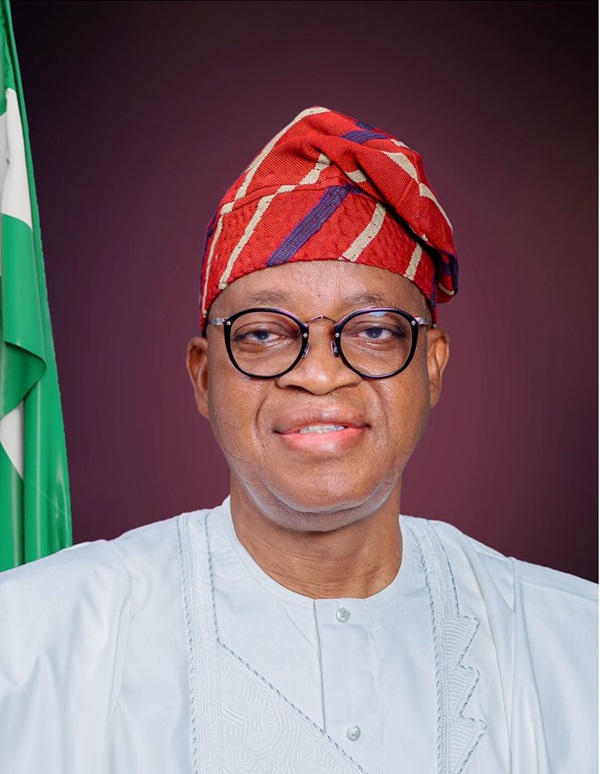
The Minister of Marine and Blue Economy, Adegboyega Oyetola has defended the 2025 budget proposal for his ministry, advocating for an increased allocation to enhance revenue generation and boost Nigeria’s GDP through ports infrastructure development.
Oyetola made this case during the Joint Committee of the Senate on Marine Transport and House of Representatives Committees on Ports Harbour, Maritime Safety Education and Administration, Inland Waterways, and Shipping Services budget defense session in Abuja. The event, themed “Budget of Restoration: Securing Peace, Rebuilding Prosperity,” provided a platform for the minister to outline his ministry’s plans and challenges.
According to him, the 2025 proposed capital budget stands at ₦11,770,533,003, with an overhead of ₦453,856. While acknowledging the proposal’s inadequacy, Oyetola appealed for the lawmakers’ support in addressing pressing issues in the marine and blue economy sector.
The minister explained that the 2025 budget seeks to consolidate achievements from the previous year while prioritising:
- Ports infrastructural development.
- Increased fish production.
- Maritime safety and security.
- Deployment of information technology to enhance operations and revenue.
- Human capacity building.
- Effective technical and economic regulation to strengthen Nigeria’s blue economy.
He stressed that the proposed projects in the fisheries and aquaculture subsectors are deliberately tied to capital budgets to ensure rapid implementation and contribute to food security.
Oyetola emphasised the sector’s significance in driving national development by creating sustainable economic opportunities, generating jobs, and fostering environmental stewardship. He encouraged states and communities to invest in and support the economy by providing essential infrastructure at ports and along coastlines.
Speaking on coastal protection, Oyetola called for collaboration among relevant ministries to safeguard Nigeria’s coastline. He also highlighted the importance of aligning budget proposals from agencies under the ministry with the National Policy on Marine and Blue Economy and the 2021–2025 National Development Plan.
Oyetola revealed that three agencies under the ministry – Nigerian Ports Authority (NPA), Nigerian Maritime Administration and Safety Agency (NIMASA), and Nigerian Shippers Council (NSC) – are self-funded and contribute significantly to the Consolidated Revenue Fund (CRF).
The National Inland Waterways Authority (NIWA) and Maritime Academy of Nigeria, Oron, receive funding from both the Federal Government’s budget and internally generated revenue. He appealed for the Council for the Regulation of Freight Forwarding in Nigeria (CRFFN) to be fully reinstated under the ministry’s budget, noting that it had been erroneously categorised under the Federal Ministry of Transport.
Oyetola also disclosed plans to integrate five agencies under the fisheries and aquaculture sector into the ministry’s 2025 budget, seeking lawmakers’ cooperation to achieve this.
The minister provided details on the ministry’s 2024 budget performance, vis: Total capital appropriation ₦10,848,512,984; Amount utilised by December 2024 ₦9,973,802,613; Remaining balance: ₦874,710,371, expected to be spent in the first quarter of 2025.
He added that the ministry received a take-off grant of ₦625,000,000, out of which ₦523,763,955 was utilised for activities, particularly in the fisheries department.
Highlighting infrastructure decay, silted river courses, inadequate fish production, and substandard river crafts, Oyetola stated that the ministry is initiating several projects and programs to address these issues.
“In 2024, we finalised key policy documents, including the National Blue Economy Strategy, Fisheries and Aquaculture Policy, and the Strategic Roadmap for Nigeria’s Blue Economy. These frameworks provide a sound foundation for the ministry’s operations,” he said.
He also mentioned the ongoing development of dry ports in Ijebu-Ode, Ogun State, and Moruya, Oyo State, designed to decongest the western port system.
Addressing boat mishaps, Oyetola announced plans to provide life jackets to riverine communities to enhance passenger safety. Additionally, the ministry will replace aging wooden boats used for commercial transport with standardised crafts and conduct capital dredging at strategic locations along major rivers in 2025.
In response, chairman of the Senate Committee on Marine Transport, Senator Wasiu Eshinlokun reaffirmed the committee’s commitment to ensuring transparency and accountability in overseeing government ministries, departments and agencies.
Eshinlokun charged the Ministry of Marine and Blue Economy to become a catalyst for revenue generation and increased remittances to the Federation Account.
He assured the minister of the committee’s support in addressing the challenges facing the sector and achieving the ministry’s objectives for 2025.
With these plans and the legislature’s backing, Oyetola expressed optimism about the ministry’s ability to enhance Nigeria’s marine and blue economy sector, contributing significantly to the nation’s development goals.

